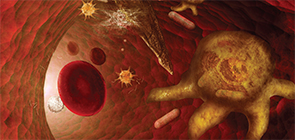
Image Credit: Carol and Mike Werner/sciencesource.com
How the immune system reacts to potential harm, such as lack of oxygen and inflammation, depends greatly on the human body’s metabolic processes and pathways, according to speakers at FOCIS 2015 in San Diego this past June.
During a session devoted to metabolism and the immune system, researchers talked about recent studies that shed light on the body’s response to disease that could lead to a better understanding on prevention and treatment. The discussion began on a high-profile topic of chronic inflammation and a recent discovery of a key protein.
Calorie Restriction
The anti-inflammatory effects of consuming fewer calories appear to be linked to a compound molecule that can inhibit the inflammasome complex that drives some chronic diseases, said Vishwa Deep Dixit, PhD, a professor at Yale University School of Medicine, New Haven, Conn., during a discussion on how calorie restriction influences the immune system.
“When you calorie restrict animals, ranging from a worm all the way up to primates, it’s known that [doing so] substantially reduces the disease burden,” Dr. Dixit said.

Dr. Dixit
Inflammation drives several chronic diseases, such as Alzheimer’s, atherosclerosis and gout. Dr. Dixit outlined studies conducted by Yale School of Medicine researchers that revealed that BHB suppresses activation of the NLRP3 inflammasome in response to the presence of urate crystals, adenosine triphosphate and lipotoxic fatty acids. Such conditions as calorie restriction, fasting and high-intensity exercise prompt the body to produce higher ketone metabolite levels of BHB. Starvation or consumption of a low-carbohydrate ketogenic diet also produces the metabolite, Dr. Dixit said.
Under starvation conditions, the body burns fat, which increases ketones that replace glucose as a source of energy to the brain and other parts of the body. However, Dr. Dixit said it is unknown how these and other metabolic fuels produced during energy deficits exactly influence the innate immune response.
It has been recognized that a starkly reduced intake of calories or fasting tends to diminish inflammation. With this in mind, researchers studying mice and human immune cells looked at how macrophages react to ketone bodies induced by restriction of calories, Dr. Dixit said.
Results from the study showed that BHB blocked the NLRP3 inflammasome by blocking a central adaptor protein needed for inflammation to occur. The significance of the discovery of this compound is that it could be useful in treatments of many inflammatory-driven conditions and diseases, Dr. Dixit said in his closing remarks.
Role of T Cells
The immune system comes into play again when talking about metabolic pathways in cancer and the important job of memory T cells to fight off pathogens., professor of biological sciences at the University of California, San Diego, spoke of her lab’s research on T cell differentiation and immunological memory. Her discussion focused mostly on regulators of the killer T cell immune response.

